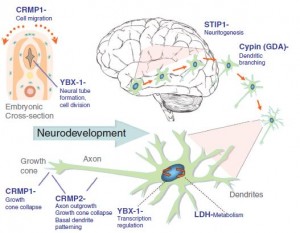While there is quite strong support to view autism as a neurodevelopmental disorder, the precise mechanisms that underlie this spectrum remain elusive. A research group from the University of California at Davis previously found evidence for autism specific antibodies that were able to recognize fetal proteins. They now turn to the specific targets or antigens for these antibodies that may be present in the developing brain.
Subjects for this study came from the Childhood Autism Risks from Genetics and Environment study (CHARGE). A total of 246 children with an autistic spectrum disorder (ASD) were compared to 149 typically developing controls. Maternal blood samples were taken and used to react with fetal rhesus macaque brain tissue. The authors employed a proteomic antigen identification procedure using tandem mass spectrometry with confirmatory results from western blot analysis.
Results revealed a significantly increased risk of offspring autism related to maternal reactivity to any of implicated antigens either alone or in combination. Reactivity to two or more of the target proteins was found in 23% of mothers of autistic children versus only 1% of non-autistic children. The researchers found 7 primary antigen targets for the maternal antibodies, namely lactate dehydrogenase A and B (LDH), cypin, stress-induced phosphoprotein 1 (STIP1), collapsin response mediator proteins 1 and 2 (CRMP1, CRMP2), and Y-box-binding protein. The particular antigens are known to be important in neuronal development and cell migration. There was some evidence that maternal reactivity to these antigens was particularly related to stereotypical behaviors.
The authors concluded that these particular antigens may be the targets of maternal antibodies that lead to abnormal neurodevelopment during gestation. Reactivity to these fetal proteins, they speculated, could be a potential biomarker for autism.
This study adds to the growing evidence suggesting that the mechanism behind at least some cases of autistic spectrum disorders relates to maternal immune dysregulation that results in disruption of neuronal development and migration in the fetal brain. It is worth noting, however, that maternal antibody reactivity was not found in the majority of ASD cases.
Reference
Braunschweig D, et al. (2013). Autism-specific maternal autoantibodies recognize critical proteins in developing brain. Trans Psychiatry 3:e277.

